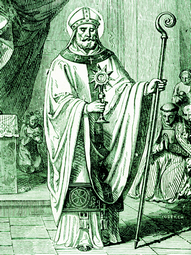Lives of the Saints
Our Models and Protectors
Spiritual Bouquet:
"Every one of you who does not renounce all that he possesses, cannot be My disciple."
St. Luke 14:33
June 6

Saint Norbert
Founder and Bishop
(1080-1134)
Born near Cologne in 1080, Saint Norbert, of noble rank and rare talents, passed a frivolous youth, abandoning himself to the pleasures and vanities of the world. Though he was a canon of the church, he refused to receive ecclesiastical Orders so as to continue to live in his caprices. He went to the court of the Archbishop of Cologne, then to that of the Emperor Henry IV, the famous adversary of Pope Saint Gregory VII, known also as Hildebrand. His conduct then became a scandal to his sacred calling, since at the court of the Emperor, like many clerics of those times, he was leading a life of dissipation and luxury.
One day, when he was thirty-three years of age, he was thrown from his horse in the midst of a terrible storm, and on recovering his senses a half hour later, he resolved upon a new life. After a severe and searching preparation, he went to the Archbishop of Cologne and humbly asked to receive Holy Orders. He was ordained a priest and began to preach against all the abuses and vices of his time. He encountered enemies and was silenced at first by a local council; however, he obtained the Pope's sanction and preached penance to listening crowds in France and the Netherlands. His example spoke still more eloquently than his words; he walked barefoot in the snows and wore a tunic which was a hair shirt, fasting all year long. He was compared to John the Baptist by his austerity and by the fervor of his preaching.
A chaplain of the bishop of Cambrai, impressed by the extraordinary changes in the former nobleman of the Emperor's court, asked to join him; this good priest, by the name of Hugh, later would succeed him in the government of the new religious Order which he was soon to found. In every place where Saint Norbert preached, those in attendance saw sinners converted, enemies reconciled and usurers return extorted wealth.
The bishop of Cambrai desired that he found a monastery and a new Order in his diocese, and the holy monk recognized at once, in a wild vale later called Premontre, the place he should choose. There he was favored, during a night of prayer, with a vision of many white-robed monks in procession with crucifixes and candles; the Blessed Virgin also appeared to him and showed him the habit he should give his religious. It was in 1120 that he gave to some trained disciples the rule of Saint Augustine, with the white habit he had been shown, denoting the angelic purity proper to the priesthood. The Canons Regular, or Premonstratensians, as they were called, were to unite the active work of the country clergy with the obligations of the monastic life. The foundations multiplied, and the fervor of these religious priests renewed the spirit of the priesthood, quickened the faith of the people, and overcame heresy.
In the time of Saint Norbert a pernicious heretic named Tankelin appeared at Antwerp, denying the reality of the priesthood, and above all blaspheming the Holy Eucharist. The Saint was sent for, to quench the error and its source, since three thousand persons had followed this man, who was allowing every vice to pass for legitimate. By Saint Norbert's burning words he exposed the impostor, corrected the erring, and rekindled faith in the Blessed Sacrament. Many of the apostates had proved their contempt for the Blessed Sacrament by burying it in walls and damp places; Norbert bade the converted ones search for the Sacred Hosts. They found them entire and uninjured, and the Saint bore them back in triumph to the tabernacle. Hence he is generally portrayed with the monstrance in his hand.
In 1126, Norbert was appointed Bishop of Magdeburg; and there, at the risk of his life, he zealously carried on his work of reform until he died, worn out with toil, at the age of fifty-three.
Reflection. Reparation for profanations and outrages to the Blessed Sacrament was the aim of Saint Norbert's great work of reform in himself, in the clergy, and in the faithful. How much do our present habits of worship repair for our own past irreverences and for the outrages offered by others to the Blessed Eucharist?
Les Petits Bollandistes: Vies des Saints, by Msgr. Paul Guérin (Bloud et Barral: Paris, 1882), Vol. 6; Little Pictorial Lives of the Saints, a compilation based on Butler's Lives of the Saints, and other sources by John Gilmary Shea (Benziger Brothers: New York, 1894).